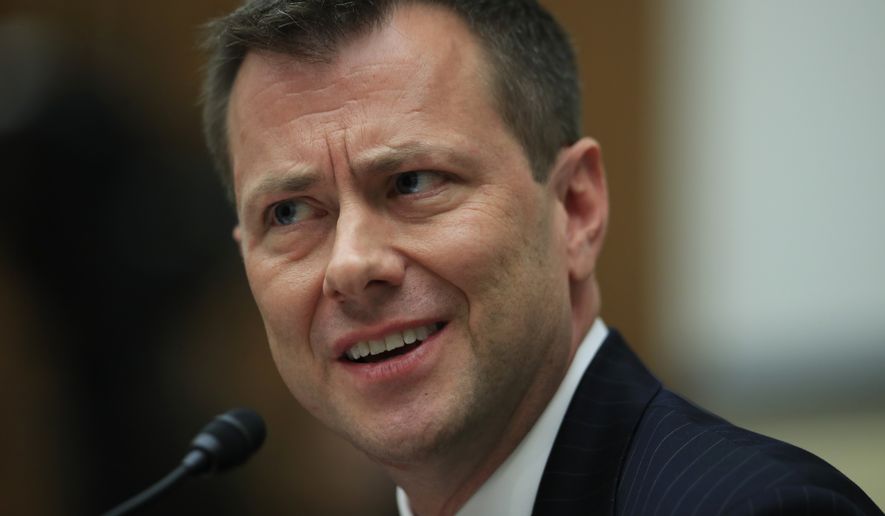FBI agent Peter Strzok conspired with his in-house lover to leak anti-Trump stories to the media in spring 2017 when he headed the Russia probe into the Trump campaign, a congressman said on Monday.
Rep. Mark Meadows, North Carolina Republican, sent a letter to Deputy Attorney General Rod Rosenstein saying a House task force had just received a new shipment of Justice Department documents.
“Our review of these new documents raises grave concerns regarding an apparent systemic culture of media leaking by high-ranking officials at FBI and DOJ,” Mr. Meadows said. “Review of these new documents suggest a coordinated effort on the part of the FBI and DOJ to release information in the public domain potentially harmful to President Donald Trump’s administration.”
Mr. Meadows provided an example.
On April 10, 2017, Mr. Strzok text-messaged Lisa Page, his lover and then-FBI counsel, to discuss a “media leak strategy.”
“I had literally just gone to find this phone to tell you I want to talk to you about media leak strategy with DOJ before you go,” Mr. Strzok said.
Two days later, Mr. Strzok congratulated Ms. Page on two derogatory stories that appeared about Carter Page, a former Trump volunteer whom the FBI was wiretapping.
The Washington Post broke a story about the wiretap on April 11, Mr. Meadows said, which suggested Trump connections to Russia.
Mr. Strzok became famous for previously released text messages that showed a strong bias against Mr. Trump. At one point he told Ms. Page he had a plan to “stop” Mr. Trump.
In congressional testimony, Mr. Strzok denied that his bias affected how he conducted the Trump probe, saying that if he wanted to he could have leaked stories to the news media.
The Justice Department fired Mr. Strzok after a scathing inspector general report.
The Meadows letter to the Justice Department was first reported by journalist Sara Carter.
Mr. Meadows told Mr. Rosenstein that the new discoveries should prompt the Justice Department to turn over messages from three other FBI and Justice officials who may have communicated with Mr. Strzok, Ms. Page and former FBI Deputy Director Andrew McCabe.
Mr. Meadows also wants communications with Andrew Weissmann, a top deputy to Russia probe special counsel Robert Mueller.
The House task force investigating the FBI’s 2016-17 Trump probe is comprised of two of the chamber’s regular committees — Oversight and Government Reform, and Judiciary.
Testifying July 12 before the House task force, Mr. Strzok presented himself as a straight arrow who didn’t let his biases interfere with his 20-plus-year FBI career. He also handled the Hillary Clinton email investigation, which exonerated her, before quickly pivoting in July 2016 to the Russia-Trump probe.
“Let me be clear unequivocally and under oath, not once in my 26 years of defending our nation did my personal opinions impact any official action I took. This is true for the Clinton email investigation, for the investigation into Russian interference and for every other investigation I have worked on. It is not who I am and it is not something I would ever do, period.”
He added, “There is, however, one extraordinarily important piece of evidence supporting my integrity, the integrity of the FBI and our lack of bias. In the summer of 2016, I was one of a handful of people who knew the details of Russian election interference and its possible connections with members of the Trump campaign.
“This information had the potential to derail and quite possibly defeat Mr. Trump, but the thought of expressing that or exposing that information never crossed my mind. That’s what FBI agents do every single day and that’s why I’m so proud of the bureau.”
• Rowan Scarborough can be reached at rscarborough@washingtontimes.com.




Please read our comment policy before commenting.